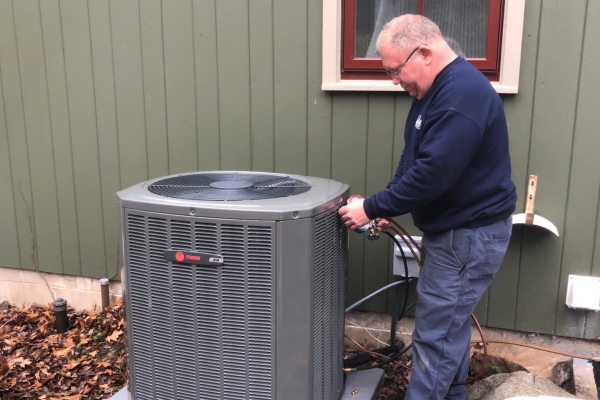Contents
- 1 Decoding SEER Ratings for Better Air Conditioning Efficiency
- 2 The Importance of SEER Ratings in Air Conditioners
- 3 Air Conditioner Efficiency: Choosing the Right SEER Rating for Your HVAC System
- 4 How to Determine Your Air Conditioner’s SEER Rating
- 5 Finding the SEER Rating on Your Cooling Unit
- 6 Incompatible Cooling Components
- 7 Air Conditioner SEER Rating: FAQs
- 7.1 What Should You Consider When Replacing an A/C System?
- 7.2 Why Does the SEER Rating Matter When Choosing a New Air Conditioner?
- 7.3 How Does a Mismatched Cooling System Impact Efficiency?
- 7.4 What Advantages Do You Gain By Consulting a Licensed HVAC Contractor Before AC Replacement?
- 7.5 What Maintenance Practices Extend the Life of a New Air Conditioning System?
- 8 Conclusion
- 9 Call Wilcox Energy for Premier HVAC Services
Are you curious about what the SEER rating on your air conditioner signifies? This important figure is key to knowing how effectively your cooling system operates, which can lead to significant energy and cost savings.
At Wilcox Energy, we are committed to guiding our customers through their choices for home comfort systems. Our focus on energy-efficient air conditioning ensures you enjoy optimal cooling performance without excessive energy expenses.
This article will explain SEER ratings, their importance, and how they can help you select the ideal air conditioning system for your home.
Switch to a High-Efficiency AC System: Experience energy-saving cooling and superior comfort with Wilcox Energy. Contact us today!
Decoding SEER Ratings for Better Air Conditioning Efficiency

SEER ratings evaluate an air conditioner’s cooling efficiency by comparing its output to the energy it uses during a typical cooling season. These ratings range from 13 to 21, and higher values signify better energy efficiency.
Thus, an air conditioner with a higher SEER rating consumes less energy to achieve the same cooling level as one with a lower rating, which means lower energy expenses and reduced environmental impact.
Enhance Your Home’s Cooling Efficiency: Allow Wilcox Energy to assist in reducing your energy costs with a new air conditioning installation. Reach out to us today!
The Importance of SEER Ratings in Air Conditioners

Grasping an air conditioner’s SEER rating prior to installation is essential due to its numerous benefits. A unit with a high SEER rating will keep cooling costs down by efficiently maintaining the desired temperature with reduced energy use, thus lowering your energy bills.
Moreover, an effectively performing air conditioner, correctly sized for your area, such as a 4-bedroom house, should be capable of lowering temperatures by 10 degrees Fahrenheit within three hours, ensuring optimal comfort. Additionally, a more efficient air conditioner lessens environmental impact by producing fewer greenhouse gases, making systems with high SEER ratings a greener option.
Quality Air Conditioner Replacement Services: Rely on Wilcox Energy to install a system that provides reliable comfort. Contact us today!
Air Conditioner Efficiency: Choosing the Right SEER Rating for Your HVAC System

A SEER rating over 14 is typically viewed as efficient, but finding the perfect rating for your home depends on various factors like house size, cooling needs, and energy consumption preferences. Higher SEER ratings indicate greater efficiency, which leads to enhanced energy savings and performance. Nonetheless, the size of your home also affects the efficiency of your HVAC system.
For example, a 14-SEER unit may efficiently cool a two-bedroom home, but larger residences, such as a five-bedroom house, may require a system with a higher SEER rating to achieve similar results. Consulting a professional HVAC contractor is advisable to determine the most appropriate SEER rating for your needs.
A larger home with additional bedrooms has more space to cool than a smaller home with fewer rooms, leading to higher cooling requirements.
A higher SEER rating reflects better energy efficiency, implying that a cooling system with a higher SEER can deliver the required cooling performance using less energy. Consequently, in a larger home with increased cooling needs, a system with a higher SEER rating would be more efficient in providing comfort while possibly lowering energy use and operational costs.
Elevate Your Cooling Experience: Achieve efficient cooling and improved comfort with Wilcox Energy. Reach out now!
How to Determine Your Air Conditioner’s SEER Rating

To figure out the SEER rating, you need to divide the total annual cooling output by the total yearly electrical energy input. Begin by multiplying the cooling capacity of your air conditioner, measured in British Thermal Units per hour (BTU/h), by the typical number of hours it runs in a day, and then multiply that by the number of days it operates each year. For instance:
A system with a cooling capacity of 5,000 BTU/h running for 8 hours daily across 180 days will produce 7,200,000 BTUs annually.
If the annual total electrical energy usage of the system is 640,000 watt-hours (Wh), the formula for the SEER rating would be:
SEER = 7,200,000 BTUs / 640,000 Wh = 11.25
This calculation effectively gauges the air conditioner’s efficiency throughout a standard cooling season.
Keep Cool and Comfy Through the Summer: Trust Wilcox Energy for expert air conditioner installations. Get in touch today!
Finding the SEER Rating on Your Cooling Unit

Per the regulations from the U.S. Department of Energy, every HVAC manufacturer is required to prominently display the SEER rating on their air conditioning units. Those models that achieve or surpass certain energy efficiency standards are marked with the Energy Star label, denoting high efficiency.
To locate your air conditioner’s SEER rating, search for the yellow and black Energy Guide label. This label is usually positioned on the side of the condenser unit and will distinctly list the SEER rating, allowing you to gauge your system’s efficiency.
If the SEER rating is not immediately visible on the Energy Guide sticker of the condenser unit, you might also find it on the air handler unit. If neither of these locations yields results, you can search for the SEER rating online. For this, compile the manufacturer’s name, model number, and serial number of your HVAC system and use these details to look up the information online or to contact the manufacturer directly.
Should these steps feel overwhelming, or if you run into any problems, it’s wise to seek the help of a professional HVAC contractor. While finding the SEER rating is typically straightforward, complications such as ambiguous labels from the manufacturer can sometimes complicate the process.
Your Local Cooling Specialists Are Ready to Assist: Whether it’s professional installations or smooth system replacements, Wilcox Energy has everything you need. Contact us now!
Incompatible Cooling Components
For optimal performance, your air conditioning system’s condenser unit and air handler must be correctly matched. Manufacturers typically design certain air handlers to work exclusively with specific condenser models, highlighting the critical nature of using matched components during setup.
Mismatching can happen, particularly with installations by less experienced contractors. Such discrepancies can lead to decreased efficiency, heightened wear and tear, and a greater likelihood of system failures, underscoring the importance of engaging experienced and proficient HVAC technicians for your installation needs.
The Hazards of Improperly Sized Air Conditioning Units

Choosing the correct size for your A/C is vital for ensuring it matches your home’s needs. A mismatch isn’t limited to incompatible parts; it also occurs when units are too large or too small for the intended space.
Oversized air conditioners can lead to short cycling, wherein the unit rapidly turns on and off, failing to remove humidity or filter air effectively. This results in poor air quality and discomfort. This frequent cycling also increases energy consumption, raising utility bills.
Alternatively, an undersized system will operate longer, overworking the unit and increasing wear and tear. This often results in more repairs and early replacement. Owners of such systems typically face higher energy costs and difficulty in achieving a comfortable indoor climate.
Experience Reduced Energy Expenses and Enhanced Comfort: Allow Wilcox Energy to equip you with a more efficient cooling system. Contact us today!
Maintaining Efficiency with Correctly Matched HVAC Systems

A high SEER rating alone cannot offset the inefficiencies of a mismatched cooling system. The HVAC system must be installed by a professional who recognizes the importance of pairing the condenser unit with the right air handler and sizing the system properly for your home.
Other Key Considerations When Selecting the Right HVAC System
When selecting the perfect HVAC system for your home, consider more than just the SEER rating. Numerous other elements are crucial for choosing a system that suits your needs effectively:
- Air Conditioner Size: Oversized and undersized units can lead to increased energy use and diminished comfort. Proper sizing is vital for efficient performance and the longevity of the system.
- HVAC Warranty: A robust warranty provides reassurance by covering necessary repairs or replacements if the system underperforms. Be sure to review the warranty details to understand the coverage and confirm it provides sufficient protection.
- Cooling System Noise: Less efficient systems may operate harder, causing elevated noise levels. Choosing a quieter model can greatly improve your living environment.
- Price of the AC Unit: Select a system that aligns with your budget while maintaining quality and efficiency. Carefully plan your finances to make an economical and effective purchase.
By evaluating these factors alongside the SEER rating, you can make a well-rounded decision that optimizes efficiency, comfort, cost, and durability.
Discover Your Perfect Cooling System With Wilcox Energy: Contact us to discuss high-efficiency air conditioner replacements. Call today!
Air Conditioner SEER Rating: FAQs

What Should You Consider When Replacing an A/C System?
When replacing your air conditioner, important considerations include your home’s size, budget, energy efficiency needs, and personal comfort preferences.
Why Does the SEER Rating Matter When Choosing a New Air Conditioner?
The Seasonal Energy Efficiency Ratio rating is vital as it measures an air conditioner’s energy efficiency. A higher SEER rating means more efficiency, which can result in substantial savings on energy bills throughout the system’s lifespan.
How Does a Mismatched Cooling System Impact Efficiency?
When components such as the indoor coil are not correctly matched with the outdoor unit in an air conditioning system, efficiency can drastically decrease. This mismatch may result in diminished system performance, higher energy use, and increased operational costs.
Expert Air Conditioner Installation Services: Depend on Wilcox Energy to set up a system that ensures steady comfort. Reach out to us now!
What Advantages Do You Gain By Consulting a Licensed HVAC Contractor Before AC Replacement?
Consulting a licensed HVAC contractor provides you with professional guidance customized to your unique situation. They can evaluate your home’s cooling needs, suggest appropriate systems, guarantee correct installation, and offer maintenance services to enhance efficiency and durability. Moreover, they can assist you in taking advantage of available rebates or incentives for energy-efficient improvements.
What Maintenance Practices Extend the Life of a New Air Conditioning System?
Routine maintenance tasks like changing or cleaning air filters, servicing the outdoor unit, examining ductwork for any leaks, and arranging professional tune-ups are essential to extend the life of your new air conditioning system. These actions keep the system running efficiently, avert expensive repairs, and enhance its longevity.
Conclusion
Choosing an AC unit with a high SEER rating is important for enhancing energy efficiency and lowering energy costs. Selecting an ENERGY STAR Certified unit can also help lower your energy bills and support environmental sustainability.
Consult a professional HVAC contractor for advice on picking the right HVAC system and running it efficiently. Their knowledge ensures you select a system tailored to your needs, maintaining comfort in your home throughout the year.
Switch to a High-Efficiency AC System: Reduce energy expenses and improve indoor air quality with Wilcox Energy. Reach out now!
Call Wilcox Energy for Premier HVAC Services
For top-notch heating and cooling services across the Southern Connecticut shoreline, contact Wilcox Energy. Our team comprises highly certified technicians skilled in delivering expert HVAC tune-ups, repairs, installations, and replacements. Each technician is equipped with the knowledge and expertise to maintain your HVAC system accurately.
Wilcox Energy ensures the region’s most competitive prices for heating and cooling services. Our maintenance plans enhance your system’s energy efficiency and home comfort and lower your heating and cooling expenses. Should you require an HVAC repair or a new system, we’ll guide you to the best options that fit within your budget. We stand behind our work with a satisfaction guarantee.
To arrange a service visit, call Wilcox Energy today. We provide free, in-home consultations. Contact us now!
For more information about our HVAC services, propane deliveries, or heating oil deliveries, be sure to contact Wilcox Energy. You can click here to contact us or call us at (860) 399-6218. Call now! Click the link to view our service area.

Related Articles:
